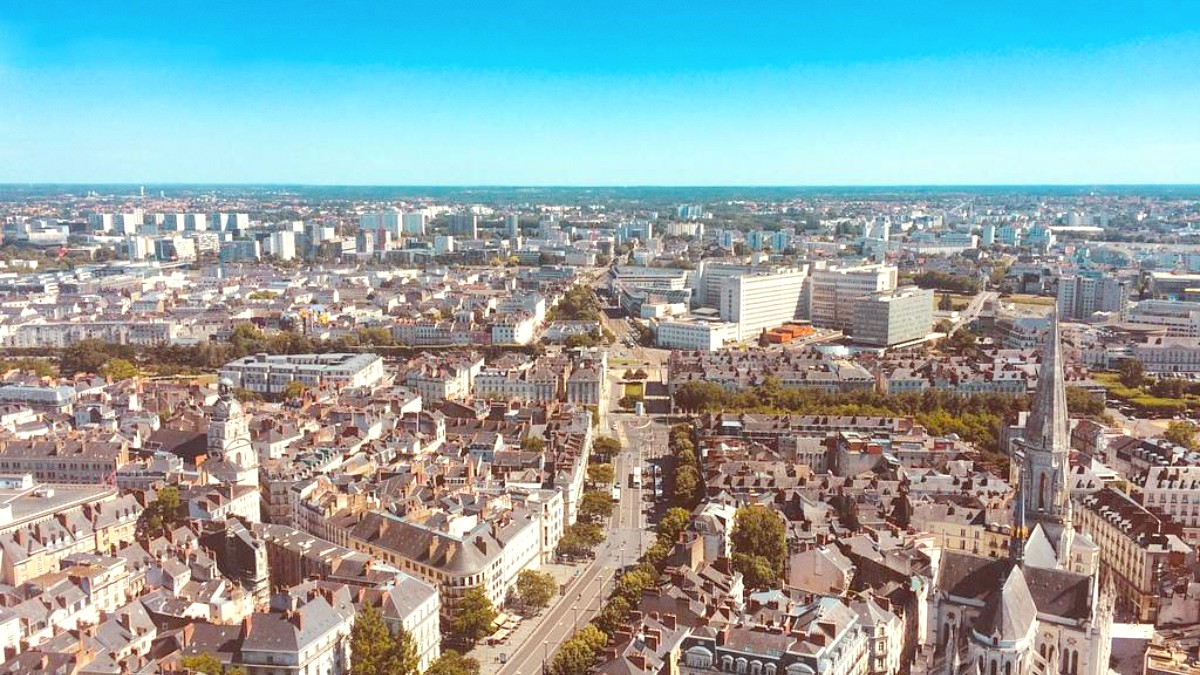
Southwestern France, France
Spring (April-May): Expect mild temperatures, generally ranging from 10-18°C (50-64°F). Rainfall happens. The city's parks and gardens, like the Jardin des Plantes, bloom, making this a pleasant time for outdoor exploration. Days lengthen, allowing ample time for sightseeing.
Autumn (September-October): The weather transitions from mild to cool, with temperatures averaging 10-18°C (50-64°F). Rainfall increases, especially towards late autumn. Early autumn (September) often has pleasant, clear days. The changing foliage in parks creates scenic views.
Outdoor Exploration: Spring (April-May) and early Autumn (September) offer agreeable temperatures, making walks and outdoor activities pleasant.
River Cruises (Loire or Erdre): Late Spring to early Autumn (May-September) provides the best conditions for boat trips on the rivers.
Crowds & Peak Prices
Warmest weather, lively atmosphere, many festivals and outdoor events like "Le Voyage à Nantes."
Accommodation and flight prices are highest. Popular attractions see larger crowds, leading to longer queues.
Good Weather, Fewer Crowds
Pleasant weather conditions without the intense summer heat or large crowds. Prices for accommodation and flights are generally lower.
Weather unpredictable, cooler days or rain showers possible. Some outdoor attractions might operate on reduced hours.
Lowest Prices, Fewest Crowds
Lowest prices on accommodation and travel. Tourist numbers are minimal, allowing for a more intimate experience. Festive Christmas period.
Cold and damp weather. Daylight hours are shorter, limiting outdoor activities. Some outdoor attractions may close or have limited operating hours.
Plan your visit around specific event dates for festivals. "Le Voyage à Nantes" runs throughout summer, "La Folle Journée" (classical music) typically happens in late January/early February, and "Les Utopiales" (science fiction) is in November.
For a balanced trip, consider a shoulder season visit. Good weather, fewer crowds, and more value.
Spring (April-May) and early Autumn (September) offer agreeable temperatures, making walks and outdoor activities pleasant without the summer heat or the larger crowds.
Late Spring to early Autumn (May-September) provides the best conditions for boat trips on the rivers.
Plan your visit around specific event dates if attending a festival. "Le Voyage à Nantes" runs throughout summer.
The city retains its charm in winter, notably during the festive Christmas period, despite cooler weather.
During summer heatwaves, seek shade, stay hydrated, and follow local public health advice.
France is part of the Schengen Area, a group of 27 European countries with abolished passport and other border control at their mutual borders.
Citizens of many countries, including the United States, Canada, Australia, New Zealand, the United Kingdom, and most European Union countries, can enter France for tourism or business for up to 90 days within any 180-day period without a visa.
Carry these documents for entry into France, even if you are visa-exempt:
Consumer visa application services IVisa and VisaHQ streamline the process for various nationalities.
Prices vary depending on your travel style and preferences.
These figures are estimates and fluctuate based on specific choices and peak season demand.
Mid-Range Traveler (€80-€180/day): Stay in a comfortable mid-range hotel (3-star) or rent an apartment (€60-€100). Dine at casual restaurants and brasseries for 1-2 course meals (€30-€50). Use public transport mainly, with occasional taxis or ride-share services for convenience (€10-€15). Visit paid attractions, museums, and perhaps one or two organized tours (€20-€30).
Choose a 4 or 5-star hotel, or a high-end boutique hotel (€100+). Experience fine dining, multi-course meals, and frequent visits to high-end cafes and wine bars (€60+).
Opt for taxis, private transfers, or a rental car for maximum flexibility (€20+).
Enjoy private tours, exclusive experiences, and shopping sprees at upscale boutiques (€40+).
Stay in a comfortable mid-range hotel (3-star) or rent an apartment (€60-€100). Dine at casual restaurants and brasseries for 1-2 course meals (€30-€50).
Use public transport mainly, with occasional taxis or ride-share services for convenience (€10-€15).
Visit paid attractions, museums, and perhaps one or two organized tours (€20-€30).
A hostel dorm bed or a very basic budget hotel room (€25-€40). Purchase groceries from supermarkets, enjoy street food, and use budget bakeries for meals (€15-€25).
Rely on a public transport pass for efficient city travel (€5-€10).
Focus on free attractions like parks, walking tours, and window shopping (€5-€10).
| Category | Item | Price Range (€) |
|---|---|---|
| Accommodation | Hostel dorm / Budget hotel (1-2 star) | €25-€80 |
| Meals | Bakery item / Casual lunch / Mid-range dinner | €3-€40 |
| Attractions | Château / Les Machines de l'île / Musée d'Arts | €8-€9.50 |
France has high standards for public health and safety.
No specific vaccinations are required for entry. Keep routine vaccinations (MMR, DTP, Hep B) up-to-date. Consult a healthcare professional before your trip for personalized recommendations.
Stay hydrated. Use Insect repellent if near water bodies or in green spaces during evenings in warmer months.
During warmer months, use Sunscreen with adequate SPF, wear a hat, and seek shade during peak sun hours.
Emergency Number: 112 (all services)
France has a high-quality healthcare system.
Pharmacies: Identified by a green cross sign, pharmacies are widely available. Pharmacists are highly trained and can offer advice for minor ailments, recommend over-the-counter medications, or help locate a doctor.
Hospitals: Nantes has multiple well-equipped hospitals, including the Centre Hospitalier Universitaire (CHU) de Nantes. For non-emergencies, a general practitioner (médecin généraliste) at a clinic.
Risk generally low due to high food and water hygiene standards. Practice good hand hygiene, especially before meals.
Pollen counts high in spring and summer. If you suffer from allergies, pack your usual antihistamines.
Tap water in Nantes is safe to drink. Food hygiene standards are rigorously enforced.
Nantes is generally a safe city for tourists.
Provide your itinerary and emergency contact information to family or friends back home.
General European Emergency: 112, Police: 17, Medical Emergency (SAMU): 15, Fire Brigade: 18
Most embassies are in Paris; keep their contact details available. They assist citizens in emergencies (lost passport, arrest).
Report lost or stolen passport/ID to local police (17) immediately for a report. Contact your country's embassy in Paris for replacement.